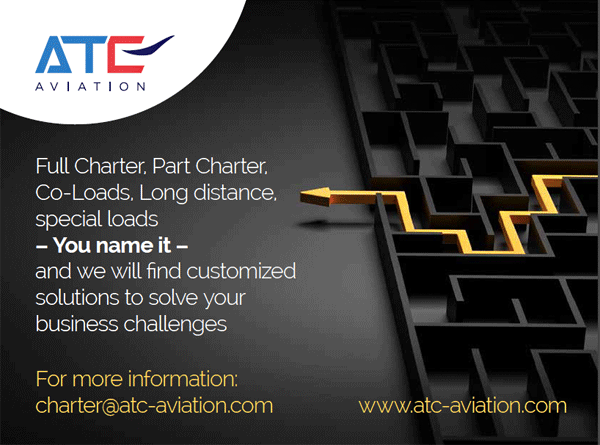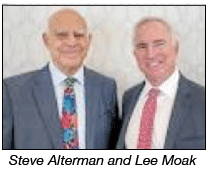
 |
| |
 |
 #INTHEAIREVERYWHERE |
| Vol. 21 No. 46 | Thursday
December 8,
2022 |
| |
Lionel Van der Walt has been in world air cargo news quite often during the past decade for his service to air cargo as part of IATA and then as leader of Cargo Network Services (CNS) and then as part of the leadership team that changed air cargo forever at PayCargo. But then everything changed almost overnight when Lionel riding high, his daughter Imma all of a sudden facing a life-threatening health situation, decided being a Dad would own his life, as she struggled for survival. Today we find Lionel about a year since we last reported returning to the fold, this time based in the UK, but not without some thoughts of what has been a very tumultous year. One thing for certain when it comes to thinking about resting his brain about the challenges of life these days, Lionel counts his blessings instead of sheep. This time of year, here is a story we can all celebrate. “Over the past few months I have on numerous occasions reflected as to how blessed our family is and cannot under any circumstance be taken for granted. “Life is back to usual, and I can't believe it has been nine months since Imma’s surgery; it all feels so surreal! “Imma’s tumor has been successfully removed and she has made a full recovery. “She has lost all hearing in her left ear, but this is a small price to pay considering what could have been; no facial paralysis, no eyesight loss, no balance issues or any other complications. “What a blessed young lady she is. “Imma is back at work and in the evenings she is completing a marketing-focused MBA. “You would never guess that a few months back she underwent a nine-hour surgery with the surgeons warning that her recovery would most probably be an extended, lengthy ordeal with a high-risk of serious complications. “Yes, she had an amazing medical team from Duke University Health in USA taking care of her, but I have no doubt that this miraculous outcome was in no small part due to all the prayers and best wishes we received from around the world. “Words cannot express our gratitude to each and every one of you who kept her in your thoughts and prayers. Thank you!! What an amazing, compassionate industry we have! “Imma is blessed to have such an extended global family. “For me it is back to work now, and I am grateful to have found another amazing opportunity, this time focused on serving freight forwarders as Chief Growth Officer at Raft. “And with this opportunity comes more substantial change for our family as it includes a relocation from Clayton, North Carolina to Tunbridge Wells, Kent in the United Kingdom (UK). The irony being that despite both countries having “United” in their names, there doesn't appear to be many united in either location, but I digress.  “Ilonka
(Lionel’s wife and partner) and I are now settling into our new home
in the UK and we are looking forward to having Imma and Amy join us here
for the holidays in a few weeks. “Ilonka
(Lionel’s wife and partner) and I are now settling into our new home
in the UK and we are looking forward to having Imma and Amy join us here
for the holidays in a few weeks. “And yes, it has been a tough transition! “Over and above the international move, we are now also officially “extreme” empty nesters. “Why “extreme”, well Imma and Amy have decided to stay in the U.S. for now, so we are parenting from a distance. “Transitioning to empty nester status is challenging in itself, never mind being separated by continents. “It was a family decision with both our girls encouraging us to make the move; it quickly became apparent though that they highly value a free UK holiday destination versus having mom and dad on their doorstep each day, go figure . . .” So why Raft? “I have always been attracted to opportunities at high-impact companies that are leading transformational change across our industry, and Raft is certainly that! “The company has an amazing team, including two exceptionally talented founders, who are leading the charge to open the industry’s mind as to the tremendous value and benefit of automating operations with AI (artificial intelligence) technology. “The company has humble roots starting as a supply chain first AI focused service provider in 2017, then called Vector.ai. The focus was initially on helping Freight Forwarders solve data extraction challenges. The key issue being how to extract the necessary information from physical and scanned documents into a digital format that can then be used in their existing TMS or other systems. “This has however proven to be just the basic foundation that is needed in order to add real value. The biggest value comes from how the extracted data is integrated into existing systems and how that data is then used to optimize processes and deliver efficiencies through aspects such as insights, workflows and business rules. “This learning has led us to where we are today, the industry’s first intelligent freight command center, a central platform, still doing data extractions and using cutting edge AI technology at its core, but now focused on adding downstream value through the automation and optimization of operational processes. “In essence Raft has developed a centralized platform specifically designed for freight forwarders, that helps them to automate and optimize their operations across the entire lifecycle of a shipment, and across globally distributed offices and teams without having to switch between numerous applications and communication systems. “The platform covers areas such as Accounts Payable, Customs, Commercial Invoice Processing, Pre-Alerts, Arrival Notices, Bookings etc. And all this data, which remains 100% owned by our clients, can then be used to provide an incredible level of transparency into their operational processes, and enhances decision making, much of which can be automated through our platform, hence the evolution from vector.ai to Raft as an intelligent freight command center solution. “And to top it all off, everything we do is focused around improving the user’s experience; the human experience is at the heart of our approach. Users can use the system to prioritize their daily activities, assign tasks across teams e.g. finance to operations and vice versa, communicate with each other via the platform and so much more. The end result being a solution designed for Freight Forwarders aimed at empowering their teams to focus on what is important. The platform is designed to automate as much of the user’s daily administrative tasks as is possible, thereby enabling them to focus on value-added activities that improve their service delivery to internal and external stakeholders. Our vision is to shift the balance from boring, repetitive administrative tasks to meaningful, fulfilling, value-add activities. “This is what ultimately attracted me to Raft, a winning, transformational solution that is improving the work experience of our clients’ team members across the globe. Working for a successful hyper-growth company is great but knowing that I am helping others to succeed provides me with a level of satisfaction and motivation that is difficult to surpass.” Speaking of which, the kind of guy Lionel is most always, includes keeping friendships warm on all fronts including both personal and business. Take the announcement on a just completed partnership between Raft and Lionel’s former PayCargo just a few weeks ago. “With the integration of PayCargo into our new one-click payment capabilities, we are arming forwarders with yet another tool they can use to solve advanced supply chain challenges with modern solutions, while freeing up their human labor to perform tasks that move the needle along the bottom line,” Lionel declared. The partnership and integration will also enable reconciliations that are sent at the end of each week and month, automated payment flows, and a central oversight and approval process that is audited and tracked. In addition, PayCargo customers will benefit from Raft’s integration with the CargoWise transportation management system (TMS), which reduces manual data input and reconciliation. “Raft’s relationships with major TMS systems helps the vast majority of our customers who use these solutions and enables a quick and easy roll out of our capabilities within Raft for payments,” said PayCargo CEO Eduardo Del Riego. “Digital payments help solve problems in the logistics industry by moving funds quickly, along with all of the data payers and vendors require,” PayCargo Chief Operating Officer and Co-founder Juan Carlos Dieppa added. If you would like to learn more, click here. Raft.ai “I would love to hear your feedback and comments on what we are trying to achieve here at Raft. “Warm regards to all my industry colleagues and friends across the globe.” Geoffrey |
 |
Celebi Delhi Cargo Terminal Management India Pvt Ltd, part of Celebi Aviation, is investing USD$1,83,65,115.00 (INR 150 crore) to enhance infrastructure at its facility at the Delhi airport. Celebi expects larger cargo volumes in the coming months. Celebi Aviation started its cargo services in 2009 when it set up the Celebi Delhi Cargo Terminal Management India Pvt, as a joint venture with Delhi International Airport Ltd. The terminal management has the responsibility of two cargo terminals with a combined capacity of 7,00,000 tons per annum at the Delhi airport. However, one of the terminals was non-operational since it was used specifically by Jet Airways, which stopped operations in April 2019. Recently, Celebi restarted the terminal after revamping it. It is now being used for cargo of the newly-launched Akasa Air. Celebi also handles the flights of Bangalore-based dedicated freighter operator QuikJet. Kamesh Peri, CEO, Celebi Delhi Cargo Terminal Management speaking about the investment had pointed out that the India market was of great importance to Celebi. That is why the investment was necessary. He had also said that the company would look at any opportunity that came its way . . . and “once we look at these opportunities from the point of view of operationalising it, whatever required infrastructure that comes along . . . we would be investing from our side.” FlyingTypers talked to Kamesh Peri about the proposed investment and the company’s future plans. FT: Celebi Delhi Cargo Terminal Management India recently announced an investment of INR 150 crore to bolster infrastructure at the facility? What are the expansion plans? KP: The Civil Aviation Ministry has set an ambitious target of growing cargo volumes to 10 million metric tons. To bolster the cargo industry’s growth, the government plans to establish 33 new domestic cargo terminals by 2024–2025, introduce ease of doing business by making processes paperless, adopt digitalization and automation, and operationalize 220 airports in the next five years. We are very much aligned with the government’s vision and are always looking for opportunities to support the necessary infrastructure development and capacity. We will be actively participating in the process of providing ground handling and cargo handling services at the upcoming airports and cargo hubs. As for the planned investment, it is aimed at improving and augmenting our current infrastructure to meet future business requirements. FT: Post-pandemic, how has business been for Celebi Cargo from Delhi/India? KP: The industry is getting back to normal. We have seen a remarkable, strong recovery in the domestic aviation sector, and subsequently, domestic cargo capacity has also returned to pre-covid levels. International cargo capacity is still recovering and has yet to reach pre-COVID levels. Most of the international sectors are operational, but the frequency is low, and not all the airlines have managed to bounce back to their full capacity. The ongoing Russia-Ukraine war has also directly affected global trade and commerce. It has resulted in high inflation and high energy costs, as well as an impact on demand from European countries. The overall recovery is steady, but the pace has slowed due to various reasons, but we are optimistic and well-equipped to handle future demand. FT: With high freight rates, how do you see the competitive scenario? KP: The year, in general has seen global airfreight rates below last year’s level and recently general rates continued their downward trend. Ocean freight is responding to the market conditions much faster than air is and is normalising faster from a rates point of view. FT: In such circumstances, what is the strategy of Celebi for efficient operations? KP: At Celebi, we would continue to invest in infrastructure, modern equipment, and technology to deliver efficient, safe and innovative solutions for the larger benefit of our stakeholders. FT: With most airports seeing a comprehensive change through digitalisation of operations for improved productivity, what are Celebi’s plans as far as IT is concerned? How will Celebi leverage technological advancements for growth? KP: We understand the importance of technology and digitisation in the logistics and aviation industries. The digitisation of manual processes brings transparency, increases efficiency, and saves time. We recently replaced the manual cargo declaration process with Electronic Shippers Declaration (EDS). Similarly, we will embrace advanced digitisation wherever possible to deliver seamless customer service. We improved the features of our warehouse management system, increased security to ensure the safety and integrity of the information, and will be looking at technologies such as blockchain, IoT, and artificial intelligence in the future to improve the overall efficiency and productivity of the operations. We will also be focusing on promoting the cargo community system so that airlines, airports, shippers, freight forwarders, and various other stakeholder groups in the cargo community can have a seamless exchange of information. FT: Would you like the government to boost its role and take more initiatives to boost cargo from the country? KP: The government is really keen to boost the growth of Indian cargo and the overall logistics industry. The Aviation Ministry has set up various advisories to look at industry-specific challenges and solutions, including one for cargo. Policymakers and industry stakeholders constantly work together to create a robust and resilient ecosystem. We welcome these positive initiatives taken by the government to augment the growth of Indian aviation. When Indian aviation is poised to become the third largest market by 2024, industry and policymakers must work closely and gradually build the capacity to address future demand without compromising the quality of services. FT: What challenges do you see in operations for the cargo industry? KP: The most unexpected challenge was the lockdown imposed all over the world during the pandemic. Despite all the restrictions and strictly controlled human movements, the aviation cargo industry emerged as a saviour for society and played a crucial role in transporting medicines, vaccines, and medical equipment across the globe and keeping the supply chains operational. The operations of cargo are dependent on many factors, and some of the factors are beyond our control. The current Russia–Ukraine war and China’s strict COVID prevention measures have affected the international supply chain and passenger and cargo movements. Global peace and harmony are the basic necessities for healthy economic growth to support certainty and stability, which in turn boosts the entire trade and cargo industries. FT: What are Celebi’s views about the future of the cargo industry in India? KP: We are very optimistic and bullish about Indian aviation and the cargo sector. The National Logistic Policy 2022 will bring transparency, efficiency, and overall ease of doing business to our logistics industry. Any growing industry has its challenges; similarly, we will also face challenges while transitioning from traditional, unorganised ways to formal system-enabled, process-oriented operations. With the government’s support and the collective efforts of industry stakeholders, the future of the Indian cargo industry is bright and cargo will play its part in supporting national economic growth goals. Tirthankar Ghosh |
|
|
 Kuehne+Nagel
has entered into a long-term agreement for a new airside facility located
in the airport zone of OR Tambo International
airport, Johannesburg, South Africa. This agreement, customers
logistics solutions, including warehousing, transportation, customs brokerage,
supply chain management, and airside support to project-specific charter
in- and outbound shipments. Core to this offering is a comprehensive cold
chain solution, ensuring around-the-clock temperature-control to safeguard
the integrity of highly sensitive pharma products, which is crucial to support
Africa’s aim to become more self-reliant in healthcare operations.
South Africa, Nigeria, and Algeria are leading the manufacturing charge
in sub-Saharan Africa, while imports from Europe, North America, India and
China remain crucial to meeting Africa’s demand for medicines and
basic healthcare. To support its healthcare customers – both importers
and manufacturers – in executing their strategic growth plans for
Africa, Kuehne+Nagel’s new facility is designed with healthcare and Kuehne+Nagel
has entered into a long-term agreement for a new airside facility located
in the airport zone of OR Tambo International
airport, Johannesburg, South Africa. This agreement, customers
logistics solutions, including warehousing, transportation, customs brokerage,
supply chain management, and airside support to project-specific charter
in- and outbound shipments. Core to this offering is a comprehensive cold
chain solution, ensuring around-the-clock temperature-control to safeguard
the integrity of highly sensitive pharma products, which is crucial to support
Africa’s aim to become more self-reliant in healthcare operations.
South Africa, Nigeria, and Algeria are leading the manufacturing charge
in sub-Saharan Africa, while imports from Europe, North America, India and
China remain crucial to meeting Africa’s demand for medicines and
basic healthcare. To support its healthcare customers – both importers
and manufacturers – in executing their strategic growth plans for
Africa, Kuehne+Nagel’s new facility is designed with healthcare and
 pharmaceuticals
in mind . . . Mediterranean
Shipping Company took delivery of the first MSC-branded
aircraft, built by Boeing
and operated by Atlas Air.
The B777-200 Freighter will fly on routes between China, the US, Mexico
and Europe. Jannie Davel,
Senior Vice President Air Cargo at MSC, said: “Our customers need
the option of air solutions, which is why we’re integrating this transportation
mode to complement our extensive maritime and land cargo operations. The
delivery of this first aircraft marks the start of our long-term investment
in air cargo.” . . . Virgin
Atlantic has announced the purchase of 10m USG per annum
of SAF to be produced by Gevo, Inc.
and supplied by Virgin Atlantic’s joint venture partner, Delta
Air Lines. The agreement with Delta builds on the existing
long-term partnership between Delta and Gevo and increases the use of SAF
from the U.S. West Coast. Virgin Atlantic has been pioneering sustainability
leadership for over 15-years and operates a 70% next generation fleet, making
it one of the youngest and most fuel-efficient in the skies. This has contributed
to a reduction in Virgin Atlantic’s total carbon emissions of 36%
over the last decade. This new SAF agreement with Delta represents 20% of
Virgin Atlantic’s 2030 SAF target and is equivalent to fuelling more
than 500 flights across the transatlantic from Los Angeles
. . . Kale Logistics Solutions
(Kale) and Dagang NeXchange Berhad (DNeX),
through wholly-owned subsidiary Dagang Net
Technologies Sdn Bhd (Dagang Net), have signed a partnership
agreement to introduce the Airport Cargo Community System (ACS) platform
in Malaysia. Under the pharmaceuticals
in mind . . . Mediterranean
Shipping Company took delivery of the first MSC-branded
aircraft, built by Boeing
and operated by Atlas Air.
The B777-200 Freighter will fly on routes between China, the US, Mexico
and Europe. Jannie Davel,
Senior Vice President Air Cargo at MSC, said: “Our customers need
the option of air solutions, which is why we’re integrating this transportation
mode to complement our extensive maritime and land cargo operations. The
delivery of this first aircraft marks the start of our long-term investment
in air cargo.” . . . Virgin
Atlantic has announced the purchase of 10m USG per annum
of SAF to be produced by Gevo, Inc.
and supplied by Virgin Atlantic’s joint venture partner, Delta
Air Lines. The agreement with Delta builds on the existing
long-term partnership between Delta and Gevo and increases the use of SAF
from the U.S. West Coast. Virgin Atlantic has been pioneering sustainability
leadership for over 15-years and operates a 70% next generation fleet, making
it one of the youngest and most fuel-efficient in the skies. This has contributed
to a reduction in Virgin Atlantic’s total carbon emissions of 36%
over the last decade. This new SAF agreement with Delta represents 20% of
Virgin Atlantic’s 2030 SAF target and is equivalent to fuelling more
than 500 flights across the transatlantic from Los Angeles
. . . Kale Logistics Solutions
(Kale) and Dagang NeXchange Berhad (DNeX),
through wholly-owned subsidiary Dagang Net
Technologies Sdn Bhd (Dagang Net), have signed a partnership
agreement to introduce the Airport Cargo Community System (ACS) platform
in Malaysia. Under the  agreement,
both parties will conduct a study on the implementation of the first of
its kind digital platform, connecting airport stakeholders at Kuala
Lumpur International Airport (KLIA) an initiative that will
improve the competitive position of Malaysian airport communities. “We
are very excited about this development, which presents a powerful case
that Cargo Community platforms need to integrate to bring greater value
to the entire nation. Together with Dagang Net, we wish to create a global
network of smart logistics hubs, starting here in Malaysia,” said
Vineet Malhotra, Co Founder
& Director, Kale Logistics Solutions
. . . China Southern Airlines,
the largest cargo airline in China and tenth largest in the world by volume,
has begun allowing freight forwarders to book shipments and make payments
on WebCargo, a Freightos
marketplace connecting air and ocean carriers with logistics companies that
arrange freight transportation. This partnership, which initially is limited
to imports into China marks Freightos’ entry into the large China
market. China Southern Air is the first airline in China to participate
in a digital freight marketplace. More than 3,500 freight forwarders using
Freightos will now have access to China Southern’s agreement,
both parties will conduct a study on the implementation of the first of
its kind digital platform, connecting airport stakeholders at Kuala
Lumpur International Airport (KLIA) an initiative that will
improve the competitive position of Malaysian airport communities. “We
are very excited about this development, which presents a powerful case
that Cargo Community platforms need to integrate to bring greater value
to the entire nation. Together with Dagang Net, we wish to create a global
network of smart logistics hubs, starting here in Malaysia,” said
Vineet Malhotra, Co Founder
& Director, Kale Logistics Solutions
. . . China Southern Airlines,
the largest cargo airline in China and tenth largest in the world by volume,
has begun allowing freight forwarders to book shipments and make payments
on WebCargo, a Freightos
marketplace connecting air and ocean carriers with logistics companies that
arrange freight transportation. This partnership, which initially is limited
to imports into China marks Freightos’ entry into the large China
market. China Southern Air is the first airline in China to participate
in a digital freight marketplace. More than 3,500 freight forwarders using
Freightos will now have access to China Southern’s  capacity
. . . Captain Lee Moak
and Steve Alterman have been
appointed to Relieable Robotics’ advisory
board. Moak and Alterman have a combined 90-plus years of aviation industry
experience, and both have served on the FAA’s Management Advisory
Council (MAC) overseeing management, policy, spending and regulatory affairs
for the agency. Moak and Alterman join as Reliable Robotics achieves a major
certification milestone with Federal Aviation Administration (FAA) acceptance
of its G-1 issue paper, defining the certificationbasis for the company’s
Supplemental Type Certificate on the Cessna
208 Caravan cargo aircraft
. . . IATA
is expecting airlines to return to profit next year after three years of
losses due to the outbreak of Covid but cargo volumes, yields and profits
are set to decline. IATA said that in 2023 it expects airlines to post a
“small” net profit of $4.7bn, which equates to a 0.6% net profit
margin and will be the first profit since 2019 when the industry made $26.4bn.The
improved profits stem from improved yields and cost control in the face
of rising fuel prices. IATA said that air cargo revenues had played a key
role in cutting losses with revenues this capacity
. . . Captain Lee Moak
and Steve Alterman have been
appointed to Relieable Robotics’ advisory
board. Moak and Alterman have a combined 90-plus years of aviation industry
experience, and both have served on the FAA’s Management Advisory
Council (MAC) overseeing management, policy, spending and regulatory affairs
for the agency. Moak and Alterman join as Reliable Robotics achieves a major
certification milestone with Federal Aviation Administration (FAA) acceptance
of its G-1 issue paper, defining the certificationbasis for the company’s
Supplemental Type Certificate on the Cessna
208 Caravan cargo aircraft
. . . IATA
is expecting airlines to return to profit next year after three years of
losses due to the outbreak of Covid but cargo volumes, yields and profits
are set to decline. IATA said that in 2023 it expects airlines to post a
“small” net profit of $4.7bn, which equates to a 0.6% net profit
margin and will be the first profit since 2019 when the industry made $26.4bn.The
improved profits stem from improved yields and cost control in the face
of rising fuel prices. IATA said that air cargo revenues had played a key
role in cutting losses with revenues this  year
expected to reach $201.4bn, which is in line with 2021, and more than double
the $100.8bn earned in 2019. In 2023 cargo markets are expected to come
under increased pressure. As belly capacity grows in line with the recovery
in passenger markets, yields are expected to take a significant step back,
IATA said . . . Amerijet
CEO Tim Strauss hopes to double
the size of the carrier’s fleet in the coming five years. The airline
has grown its fleet from eight aircraft at the start of 2020 to operating
22 today – 16 B767s and six B757s. The airline has expanded into Europe
and Asia and diversified its customer base recently with a partnership with
AP Moller Maersk. Amerijet
will be operating Maersk’s three new 767-300 freighters
. . . year
expected to reach $201.4bn, which is in line with 2021, and more than double
the $100.8bn earned in 2019. In 2023 cargo markets are expected to come
under increased pressure. As belly capacity grows in line with the recovery
in passenger markets, yields are expected to take a significant step back,
IATA said . . . Amerijet
CEO Tim Strauss hopes to double
the size of the carrier’s fleet in the coming five years. The airline
has grown its fleet from eight aircraft at the start of 2020 to operating
22 today – 16 B767s and six B757s. The airline has expanded into Europe
and Asia and diversified its customer base recently with a partnership with
AP Moller Maersk. Amerijet
will be operating Maersk’s three new 767-300 freighters
. . . |
|
If
You Missed Any Of The Previous 3 Issues Of FlyingTypers Access complete issue by clicking on issue icon or Access specific articles by clicking on article title |
||
 Vol. 21 No. 43 Buffalo Airways At TIACA If It's Wednesday It Must Be Miami Chuckles for November 9, 2022 Separating Wheat From Chaff-What's Next? ATC South America Training Youth Pumping Traffic Haltmayers Smiling Faces Going Places |
|
|
Publisher-Geoffrey Arend
• Managing Editor-Flossie Arend • Editor Emeritus-Richard
Malkin Film Editor-Ralph Arend • Special Assignments-Sabiha Arend, Emily Arend |
Send comments and news to geoffrey@aircargonews.com
|